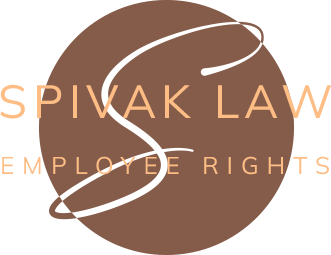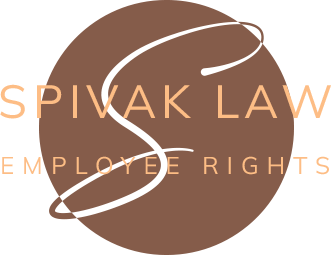
Our Services in Los Angeles, CA
Employee Rights Firm
Download Printable PDF Page Here
Were you fired for no good reason? Has your boss retaliated against you for reporting illegal activity? Has your employer treated you unlawfully and refused to make the situation right? If you answered “yes” to any of these questions, you need a legal representative who knows how to effectively advocate for you in and out of the courtroom.
At The Spivak Law Firm, we have a track record of success. Our lawyers have obtained millions of dollars in judgments and settlements for our clients, and we are ready to put 25+ years of experience to work for you. If your rights have been violated, we can fight to recover the monetary compensation you are owed under the law. We do not get paid until we reach a settlement or win. Our team is always prepared to aggressively litigate complex cases, and we will work closely with you throughout the legal process.
Request an initial consultation by contacting us online or calling (877) 242-7034. Hablamos Español (877) 452-0078.

Our Areas of Service
You shouldn’t wait to speak to a legal professional if you believe your employer has violated the law. You may only have a limited amount of time to take legal action. After assessing the facts of your case, we will advise whether you have a claim and present your options.
Our attorneys at The Spivak Law Firm can assist you with cases involving:
- Wrongful Termination. An employer cannot lawfully fire an employee on certain protected grounds. For example, you cannot be fired for discriminatory or retaliatory reasons.
- Constructive Discharge. If your employer retaliated against you by making your working conditions miserable, you may be able to file a wrongful termination lawsuit even if you resigned or quit.
- Discrimination. An employer can’t mistreat because of your sex, gender, sexual orientation, age, race, color, ethnicity, national origin, religion, disability, genetic information, medical condition, marital status, pregnancy status, immigration status, military status, participation in union activities, or exercising your right to take protected leave.
- Harassment. Many forms of workplace harassment, including sexual and racial harassment, are illegal. You may have a case if your employer, boss, manager, and/or coworkers are subjecting you to unwanted sexual advances, sexual jokes, leering, stalking, and threats that create a hostile working environment.
- Retaliation & Whistleblowers. Your employer cannot punish you for participating in certain types of protected activities, including reporting unlawful behavior at work. Examples of retaliation include wrongful terminations, unwarranted discipline, reductions in pay, demotions, inconvenient relocations, undesirable work assignments, and negative performance reviews.
- Employment Contracts and Severance Agreements. When you sign an employment contract or severance agreement, you are most likely giving up certain rights. You should always consult a legal professional before signing any contract that limits your ability to take legal action. A provision of an employment and severance agreement may be unenforceable if it violates the law.
- Defamation of Character. Your employer may attempt to “blacklist” you by spreading falsehoods to your colleagues and other employers. In these instances, you may be able to pursue a slander claim if the defamation was spoken or a libel claim if it was written.
- Overtime Wages. Under California law, your employer must pay you overtime premium wages of one and one half times your regular rate of pay if you work more than eight hours in a single workday, more than 40 hours in a single workweek, or any hours on the seventh consecutive workday in a single workweek. Employers cannot misclassify employees as independent contractors to avoid paying overtime. They also cannot misclassify non-exempt employees as “exempt” executives and administrators.
- Minimum Wage. No matter what your employer says, you must be paid the prevailing minimum wage in California, even if you are a tipped employee. Keep in mind California’s minimum wage is higher than the federal minimum wage, and some localities enforce even higher rates. California’s minimum wage also rises every year or so and some cities in California require an even higher minimum wage than the state.
- Rest Breaks and Meal Periods. California employers are required to provide a 30-minute, unpaid meal break within the first five hours of any shift over five hours. You are entitled to a second meal break if your shift is longer than ten hours. Exceptions may apply for certain industries, including the film and television industry, and certain types of positions. Additionally, employees generally have the right to take a paid, ten-minute break for every four hours worked.
- Failure to Pay Work-Related Expenses. In California, employers must promptly reimburse employees for expenses incurred as part of their job responsibilities. This includes compensation for mileage (excluding an employee’s commute to and from their home) and indemnification for mobile phone expenses and tools.
- The Family & Medical Leave Act (FMLA). Both the FMLA and the California Family Rights Act (CFRA) allow eligible employees to take up to 12 weeks of unpaid, protected leave each year. This leave must be used to deal with a medical condition (including pregnancy complications or the birth of a child) or to care for an ill family member. An employer cannot deny you this leave if you qualify for it. Additionally, an employer cannot retaliate against you for taking it.
- Pregnancy and Maternity Leave. Under the California Pregnancy Disability Leave Law, employers with at least five employees must allow pregnant employees to take up to four months of protected leave. If you work for a company with at least 50 employees, you may be able to take up to 12 weeks of protected leave under the FMLA or CFRA.
- Occupational Health and Safety. If you discover a workplace safety issue in California, you have the legal right to call attention to the issue or file a complaint with CalOSHA without fear of reprisal. You also have the right to refuse to do something unsafe.
- Freedom of Speech. Contrary to popular belief, the First Amendment does not typically apply in most private workplaces. However, California private employers cannot punish you for discussing working conditions, terms of employment, or possible unlawful activity. They also cannot discriminate against or fire you for your political affiliations or beliefs.
- Class Actions. If your employer’s unlawful conduct similarly harms a large number of employees, it may make sense to pursue a class-action lawsuit. Class representatives and their attorneys can represent comparable employees, even if their identities are unknown at the outset of the lawsuit. Recovered compensation will be split amongst all members of the class action, though courts typically award the class representatives a greater amount for their unique contributions to the success of the lawsuit.
- Private Attorney General Actions. Under the California Private Attorneys General Act (PAGA), an aggrieved employee has the right to file a special type of lawsuit against their employer on behalf of the California Attorney General when one or more labor laws have been broken.
- Invasions of Privacy. In many cases, California employers have the right to monitor company-owned devices, use surveillance cameras for security purposes, and conduct background checks when conditional offers of employment have been made. Still, there are limits to the types of information an employer can request and gather. If you suspect your privacy hasp been violated, we can analyze your case and advise whether you have a claim.
- Reasonable Accommodations. California employers are required to offer reasonable accommodations to employees with disabilities and sincerely held religious beliefs. Your employer cannot refuse to consider a requested accommodation or retaliate against you for asking for one.
We represent clients throughout California. Call (877) 242-7034or contact us online today!
Contact The Spivak Law Firm Today
.2302071229196.jpg)

